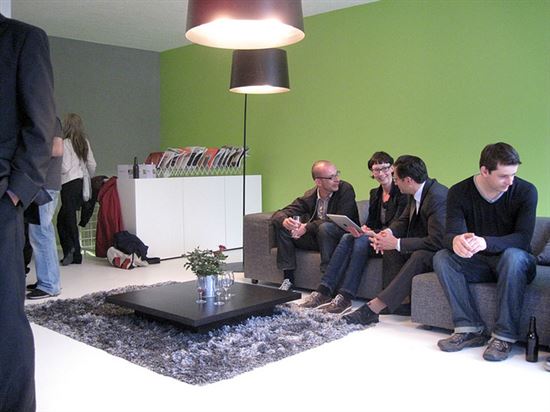23 Scientific Ways to Network Better
To connect with more people, you need to get out and make a lasting impression. But how do you do that? Read on; we explain how to do it better.
You've probably heard the phrase "It's not what you know but who you know," and that's certainly true when you're on the job hunt or searching for business opportunities. Networking can become your saving grace for expanding your social and business circle — and even improving your life. Research shows that those with bigger professional networks are more connected, more successful, and better informed.
To improve your networking game, read our list of 23 scientific ways to do it better.
 |
| © visualpun.ch (CC BY-SA 2.0) via Flickr |
1. Be authentic
Let's face it, we're not all social butterflies, and networking comes easier to some people more than others. You don't have to pretend to be someone else in order to network effectively. If you want to build a long-term professional relationship with someone, realize that being genuine is integral to building trust and rapport. Michelle Tillis Lederman, an author and executive trainer, wrote in her book, The 11 Laws of Likeability, that being authentic will help you create deeper professional relationships, and it's a whole lot easier than trying to be someone you're not!
2. Know the kind of impression that you want to make
It takes just a fraction of a second for someone to form an opinion about you. Researcher Nicholas Rule from the University of Toronto found that even when someone gets wind that their first impression was misguided, they will still choose to believe their gut feeling. Make that mini second count by focusing on how you want to come across. Do you want to seem confident? Articulate? Interesting? Experts suggest preparing for a networking event by focusing on the type of impression you want to make and practicing beforehand.
3. Know what you want to gain
Why do you want to network anyway? Having clearly written goals for each networking event and knowing what you want to gain will help you get closer to achieving them. An oft-cited study about the importance of goal setting was conducted in 1979 at the Harvard Business School, where they found that the 3% of graduates who had written down their goals were making 10 times more than their peers a decade later. The study was first mentioned in Mark H. McCormack's book What They Don't Teach You at Harvard Business School. Your goals don't have to be too ambitious; it could be a simple list of people you want to meet at an event or a rough number of how many genuine connections you want to make over the next year.
4. Compile a "target" list
A part of your planning should include who you want to talk to. If you have access to the list of keynote speakers or attendees, think of some icebreakers for those people. You can usually find the speakers on the event's website and then you can look at LinkedIn or Google to read up on those people. As it is, 74.1% of LinkedIn users have used it to research people or companies. And 38.6% believe that work helps increase their effectiveness in face-to-face networking. Doing your research before a networking function can help you be more strategic with your time and effort, which is never a bad thing.
5. Prepare an elevator pitch
How awkward is it when you ask someone what they do for a living and they stumble over their answer? Don't be a babbling idiot. Practice your "elevator pitch" about yourself beforehand so that you'll sound self-assured and knowledgeable when someone wants to know what you do. Studies suggest that the spoken word is much more powerful in conveying intelligence and mental capacity than the written word. In a study of MBA students at the University of Chicago, researchers Juliana Schroeder and Nicholas Epley found that recruiters who heard the student's elevator pitches saw them as more competent than students whose pitches they read.
6. Dress to impress
How you dress can have a big impact on how others perceive you, whether you like it or not. In a survey by Salary.com, 56% of respondents said they've made assumptions about their coworkers based on what they wear, with some saying that those who are poorly dressed come across as unintelligent and lacking respect. And in a CareerBuilder survey, 60% of employers said that dressing inappropriately was a common interview mistake. Lucky for you, networking events can give you a chance to show off your best outfits. Mix your lucky suit with a shot of color or a fun print to let your personality shine through.
7. Mind your body language
So you've put on your best suit, styled your hair, and brushed your teeth, but your networking game still might be missing a crucial component — control over your body language. Maintaining a healthy amount of eye contact has been known to communicate confidence and intelligence, while breaking eye contact is linked to low self-esteem. Smiling makes you more approachable to others and also releases neuropeptides (which decrease stress) and neurotransmitters (which make you more relaxed). So the next time you walk into a networking event, remember what your mother told you: Chest up, shoulders back, eyes forward, and smile.
8. Build rapport
There's a whole science to building rapport with new acquaintances, and it's used by physicians, teachers, salespeople, social workers, and entrepreneurs. Salespeople, for example, employ a variety of tactics to ingratiate themselves with clients, such as trying to find common ground. While you might not be a salesperson per se, if you focus on the things you have in common with the other person, you'll find that the conversation flows effortlessly. Humor and self-disclosure are other tactics that researchers believe help build close relationships.
A study conducted by researchers N.L. Collins and L.C. Miller found that those who disclose a little about themselves are liked by others more than those who don't. Mirroring, or what researchers call behavioral synchrony, is another tactic that increases feelings of closeness between acquaintances. Behavioral synchrony occurs when you match another person's body language, tone, and energy. There's a subtlety for doing it right: For example, it might help to lower your voice when talking with someone who is soft spoken to match their vibe and make them feel at ease.
9. Give compliments
Nobody likes a suck-up, but you'd be hard-pressed to find someone who doesn't appreciate a genuine compliment. If you were impressed by a keynote speaker's speech, tell them. If a new acquaintance is involved in a fascinating side project, let them know. A study published in the Journal of Marketing Research shows that even if customers know they're being flattered in order to be persuaded to buy something, the flattery still has a positive influence on their self-esteem and their shopping choices. In other words, you have nothing to lose by giving a well-deserved compliment to someone you respect.
10. Listen
Do you ever go to a networking mixer and feel like everybody is just talking at each other without listening? One way to stand out from the crowd is to practice active listening and ask thoughtful questions. People at networking events love nothing more than to talk about who they are and what they do, so indulge them! Researchers from the University of South Alabama surveyed 354 managers to find out what skills they value most in prospective employees, and the results showed that listening and conversation skills are some of the most useful skills in the workplace. Before you launch into your elevator pitch, give the other person the floor — it's sure to make them feel important and make a good impression.
11. Add value
Professional relationships are unique because many of them are almost solely based on necessity. While we might eat lunch with coworkers or chat about our families with our bosses, professional relationships tend to fade away when they are no longer practical. Aristotle called these types of relationships "friendships of utility" because they last only as long as the subjects are mutually beneficial to each other.
In that case, you may want to take it upon yourself to make the relationship worth more than that. Find ways to show that you add value to the other person's professional life, and you'll bolster the value of your friendship at the same time. You can do this, according to the experts, by actively sharing your knowledge and experience, and opening up your network to others (your value will double any time you make a referral or agree to recommend a colleague). Remember that networking is a two-way street, and if you help someone in need, they'll be more likely to return the favor.
12. Be selective when networking
If you feel like you're playing a numbers game while networking, trying to collect as many business cards as you can, you're going about it all wrong. Many experts, including Eric Holtzclaw, a serial entrepreneur, believe that networking should be about quality over quantity. He argues that the most useful networking relationships are those that are meaningful rather than superficial. You don't have to work the room in order to be successful at a networking event. You also don't have to go to every networking event that you're invited to if you don't think it will be productive. Being selective in your networking can help you focus your energy on the people or events that really matter. Just one meaningful conversation may pay off more than 10 superficial ones.
13. Meet up with your professional contacts in a casual setting
At the heart of successful networking is making a lasting impression. You want to be known as likeable, and the way to do that is to have fun with another person. Researchers have confirmed this by finding that those who can work hard and play hard are more respected and have larger social networks. Just sharing a meal has been proven to help create bonds between two people. A study published in the journal Proceedings of the Royal Society B revealed that chimpanzees who share food have a higher level of oxytocin, a hormone related to bonding and loving relationships. Don't be afraid to let your hair down once in a while with your colleagues.
14. Be more strategic with your current network
Look beyond the professionals you know to your social circle. Friends, family, acquaintances, neighbors, and even your hairdresser could connect you with people in high places. In a study from the National Bureau of Economic Research, researchers found that people who live in the same neighborhood are 33% more likely to work at the same place because of neighborhood referrals. Economist Michelle Pellizzari discovered that 25% to 40% of people found their current job through informal networks, such as family and friends. Using your friends and family for professional aims isn't cheating; it's leveraging your informal network.
15. Get involved in your community
Meetups, volunteer groups, and other types of community-building activities can help you practice your conversation skills and meet interesting people from other industries. The Corporation for National and Community Service found that people who volunteer are 27% more likely to find a job than those who don't, based on their increased social and human capital that they gain through volunteering. If you feel like you're in a rut going from one networking workshop to another, maybe it's time to try different avenues of connecting with people.
16. Find networking opportunities in your daily routine
You never know who you might bump into while you're running errands, whether you're at the gym, the doctor's office, on an airplane, or picking up your kids from daycare. According to some experts, places like these have become the new hotspots to network with other people. Business card vendor Moo.com conducted a survey in 2012 of its clients' networking habits, and the results showed that many are handing out business cards in the unlikeliest of places. 45% hand out the cards at parties, 28% at bars or restaurants, 16% during their daily commute, 13% on airplanes, and 11% at the gym. So, the next time you head out the door, remember to bring your business cards, a pen, some breath mints, and an open mind.
17. Always follow up
If you spent the evening charming everyone within earshot, don't let your networking efforts go to waste by not following up. Staffing company OfficeTeam discovered that 28% of senior managers said that failing to keep in touch is the biggest networking mistake. Make time in your schedule to follow up with people you've met each month. Send a friendly email, invite them to another networking event, or send them an article that relates to something you discussed. It doesn't take much to keep the relationship fresh, and hopefully it will show them that you have a lot to offer as a business contact.
18. But be patient (not intrusive)
Like any relationship, building rapport with a person you meet while networking can take time. While you should keep in touch with new contacts, inundating an acquaintance with follow-up emails will come off as too eager, or even creepy. Even worse, word might get around that you're abusing the unspoken code of networking, which may make it difficult for others to take you seriously or give you their contact information. A general rule to follow is to reach out to other people once a month and see if they bite. Like many romances, professional relationships take time and patience.
19. Know how to sell yourself
What are your strengths? What do you have to offer other people? How will you "sell" yourself to others? If you can't answer these questions, you could have a hard time showcasing your value to other people. Career experts call this ability "personal branding" and say it's a key way to grow your professional network. In a survey conducted by the Glenn Llopis Group, a training consulting firm, 70% of professionals claimed they defined their personal brand but only 15% truly did. Asking yourself pertinent questions that relate to who you are, what makes you unique, and what you bring to the table can help you solidify your personal brand and walk with confidence into a networking event.
20. Stay active on social media
Your social media profiles are useful resources to make new connections and keep in touch with old ones. About half (48%) of respondents in the OfficeTeam survey believe that Internet networking is the most useful way to meet business contacts. Even if you don't use it as your primary method of networking, you can use it to showcase your expertise, research other people, share industry knowledge, and stay connected to other people you meet. If you use your social media accounts for both work and play, you should make sure you don't have anything scandalous or incriminating on your profiles. A Jobvite survey of recruiters showed that more than 90% use LinkedIn to recruit, follow-up with, and vet candidates. A high percentage of recruiters would also react negatively to unfavorable content, like grammatical errors or profanity. Think of the image you want to project to the world and craft your online image carefully.
21. Do what you said you'd do
It's not enough to say the right things and seem like you have the right connections. Professional relationships are based on trust, and you have to demonstrate with your actions that you honor your word. That includes following up if you say you're going to, sending them an article or invite if you mention it in conversation, and helping them out when they need a hand. The OfficeTeam survey shows that 7% of managers think that the biggest mistake someone can make is to not provide help to someone when they ask for it. If it's within your power, help your colleagues, because you never know if the roles will be reversed in the future.
22. Always give thanks
Nothing's worse than giving someone a helping hand, and then not hearing from them ever again. Showing gratitude to those who assist you isn't just the polite thing to do, it also goes a long way in solidifying your bond and makes it more likely that they will help you out in the future. 17% of respondents in the OfficeTeam survey said that not thanking someone after they have helped you is a big networking no-no. Demonstrating gratitude by sending an email or handwritten note is simple and only takes a few minutes, but it can make all the difference in your networking strategy.
23. Nurture ALL your professional contacts
You're going to meet people from all walks of life while networking, and some connections may seem more useful than others. Remember that every contact that you make, even if it initially seems useless, is a valuable one. Only 6% of respondents to the OfficeTeam survey believed that burning bridges with past employers is a huge mistake. A study by Iain Edmonson of tech entrepreneurs' networking habits showed that the benefits of a relationship forged while networking aren't always apparent in the beginning. Nurture every professional relationship that you make, and your networking circle will naturally expand over time.
Cassy Parker is a contributing writer at CreditDonkey, a credit card comparison and reviews website. Write to Cassy Parker at cassy@creditdonkey.com. Follow us on Twitter and Facebook for our latest posts.
Note: This website is made possible through financial relationships with some of the products and services mentioned on this site. We may receive compensation if you shop through links in our content. You do not have to use our links, but you help support CreditDonkey if you do.
|
|
|









